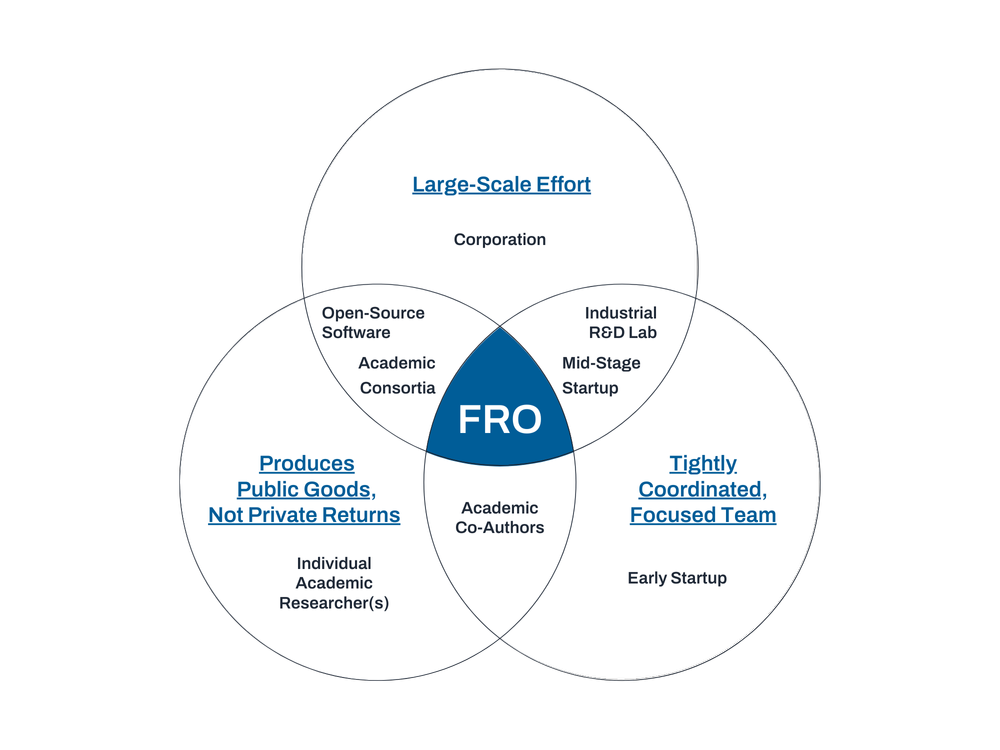
Focused Research Organizations: A New Model for Scientific Research
Scientific research and development often occurs in starts and stops: insights and innovations grow rapidly out of new research fields, but over time, the low hanging fruit is picked off, bottlenecks arise, and progress dwindles. Overcoming these bottlenecks can be extremely rewarding because of the potential to trigger a cascade of follow-on research. Yet, university labs and commercial organizations are not always incentivized to tackle these challenges. Academic incentives disfavor medium- to large-scale teamwork across disciplines and projects with a low possibility of publishable results, while commercial profit motive precludes the production of public goods, so projects that fall in between academic and commercial incentives often go untouched.
Enter Focused Research Organizations (FROs), a new type of non-profit research organization designed for this middle ground. FROs are structured like start-ups with tightly coordinated, medium-sized teams that allow them to engineer and scale solutions in a way for which university labs are ill-suited. FROs focus on solving well-defined challenges to produce public goods that are neither profitable nor publishable: processes, tools, and datasets that enable the use of new research methods and accelerate the pace of scientific research. Successful large-scale research collaborations of the past like the Large Hadron Collider and the Human Genome Project could be considered similar such projects since they produced tools and datasets that enabled new particle physics and genomics research, though they’re of a far larger size and scope. While we may only fund one or two such large scale projects in each generation, there are plenty of mid-scale problems that could be economically solved with a FRO.
Launched in 2021, Convergent Research is a non-profit organization dedicated to incubating and funding new FROs, and their work is growing: in March of this year, Forbes reported that Convergent Research received $50 million in philanthropic commitments to launch two new FROs, doubling the size of their small portfolio. Convergent Research FROs are now:
- developing tools to map all of the neural circuits in the brain and advance neuroscience,
- identifying the unintended/unknown molecular targets of every approved pharmaceutical drug to improve drug development and repurposing,
- developing technologies to scale protein analysis by 100x and accelerate proteome biology research,
- and creating open source tools for life scientists to conduct synthetic biology research on a more diverse set of microorganisms.
While Convergent Research has so far only funded FROs working in the life sciences, this research model can be applied to bottleneck research problems in any field.
Convergent is also not the only organization experimenting with this model though: the UK government’s new Advanced Research and Invention Agency (ARIA), inspired by Advanced Research Projects Agencies (ARPAs) in the U.S., plans to fund FROs as part of its strategy. ARIA will be the first governmental program to fund FROs, and hopefully not the last. Philanthropic funding simply cannot compare with the scale of government funding for scientific research. As the largest science funder in the world, the U.S. federal government provides enormous potential to expand the number of FROs that get launched over the next decade to accelerate scientific progress.
To help agencies conceptualize the types of scientific and engineering problems that FROs can address, FAS and Convergent Research have come together to create a database of vetted FRO proposals from researchers across the sciences. These proposals tackle a range of problems from developing neuromorphic AI hardware using superconducting optoelectronic networks to building open-source computational infrastructure for the monitoring, reporting, and verification of ocean-based carbon removal. Curious agencies can look to our database for inspiration on how FROs can fit into their particular research priorities. If any agency finds a proposal particularly compelling, we welcome them to reach out to FAS or to the proposal authors for more details.
As federal agencies begin developing their FY25 budget proposals this month, those that fund scientific research—the National Science Foundation, the National Institutes of Health, the Department of Energy (DOE), the National Aeronautics and Space Administration, the Department of Defense, the Department of Agriculture (USDA), and the National Oceanic and Atmospheric Administration (NOAA)—should follow in the UK’s footsteps and request pilot funding for FROs to complement their more traditional research programs. Because of their potential to unlock bottlenecks and improve overall research productivity, FROs can be a means of enabling more scientific progress with less funding under the new budget deal.
Beyond agency interest and funding, Congressional authorization can also help launch FROs within the U.S. government. All of the agencies mentioned above have the Other Transactions Authority (OTA) necessary to pilot FROs, except for the USDA and NOAA. (AgARDA within USDA does have OTA, but it currently lacks funding.) Thus, Congress should prioritize providing the USDA and NOAA with OTA for R&D such that the agencies can not only experiment with FROs, but also other novel research models that are useful for their mission but are not traditional grants or contracts. For all science agencies, explicit Congressional authorization to fund FROs would motivate and assure agencies of their legal authority to fund FROs, since some agencies, like the DOE, have been historically more conservative in their use of OTA than others.
The Federation of American Scientists supports Congress’ ongoing bipartisan efforts to strengthen U.S. leadership with respect to outer space activities.
By preparing credible, bipartisan options now, before the bill becomes law, we can give the Administration a plan that is ready to implement rather than another study that gathers dust.
Even as companies and countries race to adopt AI, the U.S. lacks the capacity to fully characterize the behavior and risks of AI systems and ensure leadership across the AI stack. This gap has direct consequences for Commerce’s core missions.
As states take up AI regulation, they must prioritize transparency and build technical capacity to ensure effective governance and build public trust.
